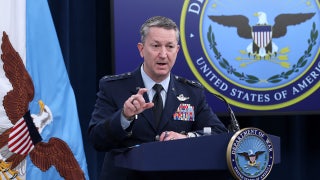The Obama administration formally announced a new cybersecurity agency Tuesday afternoon, following a string of high-profile cyber-attacks on U.S. companies.
White House counterterrorism adviser Lisa Monaco announced the new Cyber Threat Intelligence Integration Center (CTIIC), modeled on the National Counterterrorism Center, at the Wilson Center in Washington.
“The actions we take today and those we fail to take will determine whether cyberspace remains a great national asset or increasingly becomes a strategic liability, an economic and national security strength or a source of vulnerability,” Monaco said.
Officials told Fox News the center is being established by presidential memorandum, under authority from a 2004 intelligence law. According to the administration, they plan to use existing funds in the 2015 budget and are requesting another $35 million in the 2016 budget proposal for the agency.
Several agencies already fight hackers -- the CIA, Department of Homeland Security, the FBI and the NSA -- but currently there is no agency that coordinates and shares threats. “The CTIIC is intended to fill these gaps,” Monaco said.
She said the agency would be “responsible for producing coordinated cyber threat assessments, ensuring that information is shared rapidly among existing cyber-centers and other elements within our government, and supporting the work of operators and policy makers with timely intelligence about the latest cyber threats and threat actors.”
In this year's State of the Union address, President Obama urged Congress to pass legislation "we need to better meet the evolving threat of cyber-attacks, combat identity theft, and protect our children’s information."
Cybersecurity leaped nearly to the top of Obama's agenda after major hacking attacks against Anthem Inc, Home Depot, Sony Pictures, Target and more.
The hackers who targeted Anthem, the second biggest U.S. health insurer, and accessed personal information of 80 million customers, may have been inside its system for more than a month before being detected, according to the company.
In the Sony Pictures hack, the attackers who breached the Hollywood studio's network went unnoticed until computers were paralyzed and a mountain of data was dumped on the Internet.
The amount of data copied and removed from Sony's systems should have set off internal alarms long before Sony workers found their PCs taken over by malware, said Mike Potts, CEO of Lancope, a network security company based in Alpharetta, Georgia.
The cybersecurity industry characterizes such long-term intrusions as advanced persistent threats or APT. They are often sponsored by states and target valuable commercial and military information.
Unlike the National Counterterrorism Center, which gets most of its information from intelligence agencies, the new cyberagency may rely to a much larger extent on private companies, which are regularly seeing and gathering cyberintelligence as they are hit with attempts by hackers to break into their networks.
Gathering threat signatures, and profiling hacker groups, has become a key component of collecting cyberintelligence -- a discipline practiced both by government agencies and private firms.
U.S. intelligence officials have been warning about the dangers of cyberattacks for years, and the public is starting to pay close attention.
Fifty-seven percent of Americans in a new Associated Press-GfK poll conducted Jan. 29-Feb 2 think there is an extremely or somewhat high risk of a foreign country or terrorist group making a major cyberattack on computer systems inside of the United States. That is more than the 50 percent who say the risk of a terrorist attack is somewhat or extremely high.
On the other hand, fewer Americans say the risks posed by computer hackers are important to them personally (57 percent) than say the same of terrorism (71 percent).
Just over half of Americans, or 51 percent, approve of the way Obama is handling threats posed by computer hackers, the survey found.
The Associated Press contributed to this report.












































